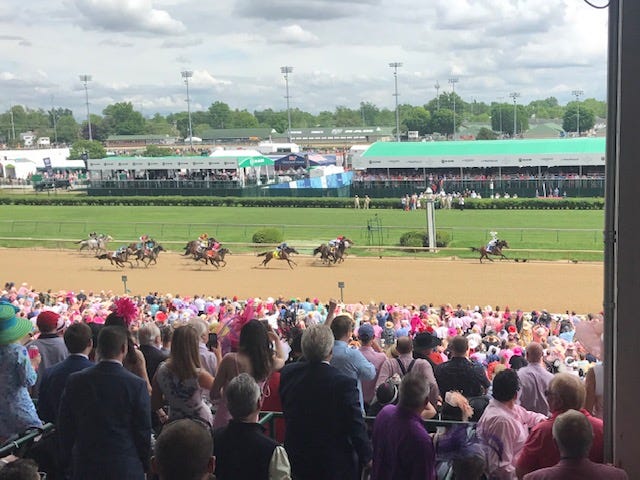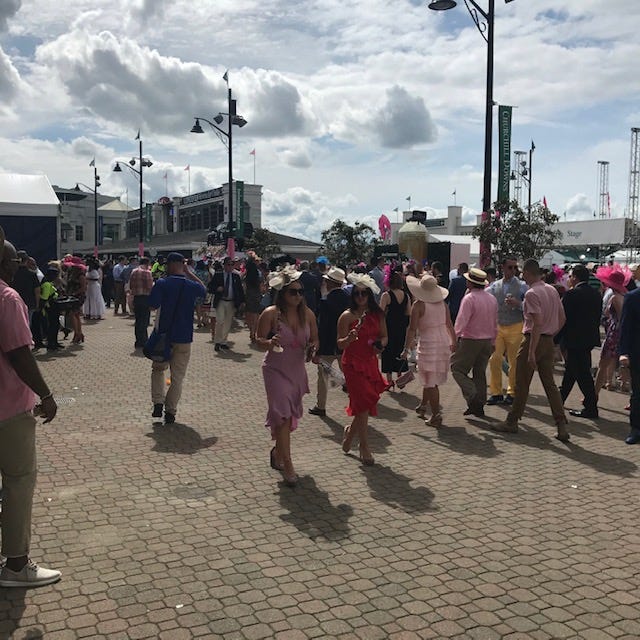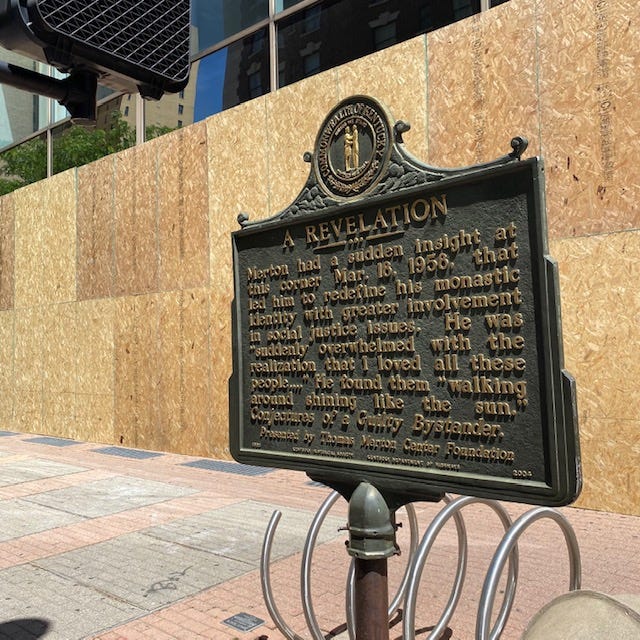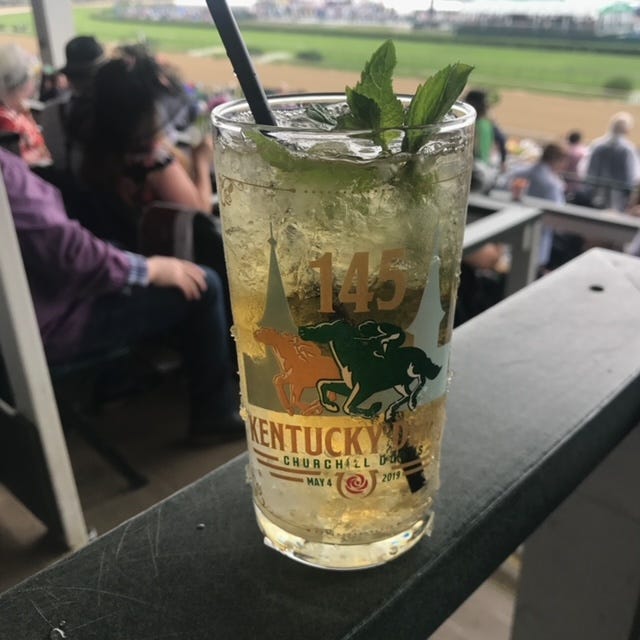Some smaller cities want to be big. Louisville just wants to throw a party.
Certainly, there are people in Kentucky’s largest city who dream of superlatives grander than that, of the city becoming a boomtown like Atlanta, Austin or Nashville. There are pushes, as earnest as they are unlikely to succeed, for the city to obtain an NBA or MLS franchise1. The mayor, a somnambulant third-termer whose sole qualification for the office in the first place was a fortune made selling a better ice-maker, only seems comfortable in the job when he’s wooing out-of-town business with the promise of a Possibility City. There are people who dream of Louisville stepping into the first tier of American cities.
This week? Those people are getting out-of-office replies to their emails.
One way—perhaps not the best way, but certainly one way—to judge a city is by its elevator pitch: the things an outsider will understand about the place before they even arrive, and the things there will be for them to do if they visit for a long weekend. Louisville’s elevator pitch is stellar, one that cities three or four times its size could be jealous of. Stop by for 72 hours, and you won’t be disappointed.
If that 72 hours happens to be the first weekend in May? Well, then there isn’t a city in the world that this small town can’t go toe-to-toe with.
I’ve written about it before, including a sizable profile for SBNation in 2019, but it bears repeating: Derby season in Louisville is a big damned deal. It’s hard to explain just how much of an impact the event has on the city, and I’m not just talking about economic impact. It’s a true holiday season, one that shapes life in town the same way the Christmas season does in other places. Entire cottage industries are built on it; business and school schedules bend to it; it exists as a point of reference at all times, a known spot on the calendar. Don’t plant your garden before Derby.
Of course, it should be a big deal. Louisville’s a city of around 700,000 people, but if you drive by Bowman Field, the general-aviation airfield east of downtown, on the first Saturday in May you could be excused for thinking it was Las Vegas, Monte Carlo or Dubai. The Queen of England never stopped by Jacksonville or Oklahoma City, is what I’m saying. (At least as far as I know. Maybe she got a hankering for Stupid Nick’s Wing Dump once.) The sheer mass of people, wealth and attention that pours into the city the week of the Kentucky Derby is staggering; there’s a party in every venue in town, and ten thousand more in backyards around the area. It’s far bigger than Churchill Downs.
That’s saying a lot, too, because Churchill Downs is really freaking big.
I mean this in the kindest way possible, especially if two years from now I’m applying for a press credential again and someone at the Downs ends up reading this: Churchill Downs is one of the most important venues in American sports in large part because it still feels like a shithole. The inherent vice and grime has been buffed off of most of our sports leagues in the interest of making them safer, cleaner and more profitable, and you can feel the absence in every modern stadium that’s risen in place of an older one. Yankee Stadium (2009) is an atrocity, an airport-lounge version of the place it took a name from, and short of Lambeau Field, there isn’t a stadium left in the NFL that John Facenda’s baritone would sound right over highlights from.
Churchill Downs? It’s still got that aura. Sure, it’s got all the modern amenities those venues were built to provide, layers and decades of additions rising in massive, millionaire-friendly tiers high above the iconic 1895 twin spires. But the grit, grime and glorious grossness still exists in the dark concourses, the tunnels that lead you under the track to the sprawling infield, the ramshackle small town of the backside.
The first time I walked into the venue, I was overcome with awe that any place that felt like this still existed, and that was on late May day of nothing-special races when maybe ten thousand people filled the cavernous stands. On a normal Derby Day, over 150,000 people crowd into every nook, cranny and Mansion on the grounds. It’s a breathtaking sight even if you don’t give a shit about horse racing, and I’d reckon a decent portion of the people in the stands don’t. The day is structured around the races, sure, but there’s less than half an hour of that over a very long day.
The rest is simply a party like you’ve never seen.
Fashions that would look preposterous at a gala or on a runway look right at home here, and if you refuse to participate in the sartorial arms race, it’ll be you who looks silly, not the guy in the floral-print suit. The money flows as freely as the sickly-sweet premixed mint juleps at the concourse bars, and it’s easy to get lost in the clamor and dizzy cheer of the day, waiting around for the only two minutes that actually matter. In that sense, it’s like New Year’s Eve, only if the ball drop happened on a mile and a quarter of dirt track in the late afternoon of a spring day.
Last year felt empty.
It felt empty everywhere, of course, but the first Saturday in May passing without the Kentucky Derby felt like showing up to Old Faithful and finding a “closed for renovations” sign on the geyser. Moose out front shoulda told ya. Something was missing, and everything felt off. It rains at least part of most Derby days, so of course last year it was brilliantly sunny and warm on that day, a meteorological irony that was repeated the day the race was eventually held without spectators in early September. On the proper day in May, there was no horse race and a still-poorly-understood pandemic, and so the people in my neighborhood all stood in our separate front yards and got drunk on bourbon anyway, because what else are you going to do?
That felt like it would be the story of Louisville’s year until it wasn’t, of course. The things the city really doesn’t want to reckon with—the inequality, the division, the segregation and the lack of justice for all—came to a head last summer as the story of Breonna Taylor’s killing entered the public consciousness.
When I say that Louisville doesn’t want to be a big city, some of that sense is benign: not wanting the gridlock of a boomtown like Nashville, not wanting to give directions that don’t hinge on turning at where a long-closed stored “used to be”, not wanting to be able to know exactly where someone went to high school and what that means about them. Some of it is less forgivable, though; it can feel like a place that doesn’t want to be a modern city, doesn’t want to talk about the lives of all of its citizens, doesn’t want to admit what life is like on the other side of a six-lane road.
For some, the overwhelmingly-peaceful protests that defined Louisville’s summer last year were an opportunity for soul-searching, for reflection about the kind of city we want to be. For others, though, the moment offered just another chance to fearmonger and demonize, to focus on exactly the wrong things to sell a narrative to people who’d never dare to visit downtown anyways. A few windows were broken, and miles more were boarded up by landlords who knew their buildings were emptied of telecommuting workers and took the easiest route they saw to protecting their bottom line, even if it made the business district look like a ghost town for months.
People with malicious agendas will try to tell you downtown Louisville was a war zone last summer; I can tell you firsthand that it wasn’t. The faces of the people who held daily vigil in Jefferson Square for months weren’t filled with rage, but with anguish over a justice that would be impossible to give and an accountability that never came.
This isn’t a screed against the city from an outsider. I am an outsider; I wasn’t born in Louisville, and I only moved here seven years ago. I’ve cast my lot with this city, though, and call it my home for now and for the foreseeable future. My children were both born here, Louisville natives who don’t know Oaks Day isn’t a school holiday most places, and they’ve both got a slight hint of bourbon in their accents that didn’t come from their mother or I, flat-voiced Midwesterners both. I’m not trying to denigrate the city; I’m at once appreciating it for the joys of what it is and lamenting the things it can’t or won’t yet be.
In a sense, the absence of a true Kentucky Derby last year felt apt; the city was not whole, and could not be made whole by throwing a party. This year, there will be a race on the first Saturday in May, but not like we’ve known it before. Churchill Downs will be at around half its normal capacity, and the usual horse-race haute couture will include facemasks to match the hats and dresses. Perhaps next year it will be back to normal, or the year after that, but it will sooner or later, because the kind of event that lasts for nearly 150 years doesn’t go away quietly.
The Kentucky Derby is a problematic fave, an antebellum pageant held in a lower-income neighborhood, centered on an oft-maligned sport, infused with crass wealth and greed, and soundtracked by the most beautiful song you can possibly hear on a May afternoon as long as you don’t listen to the actual lyrics. It’s possible, I think, to reckon with all of this and still enjoy the event, perhaps if for no other reason than because there should be a holiday like this on the first true spring weekend, one where we all get dressed up in our brightest outfits and throw elaborate parties and drink too-sweet drinks and can still be in bed by 9pm, sunburnt or soaked or simply spent, because that’s just what we do on the first Saturday in May.
Accepting that doesn’t mean accepting the rest; Louisville doesn’t need to be a big city and it probably wouldn’t wear the notion well. It can be a better city, though, one that doesn’t have to sweep anything under the rug before the world comes to town. I want the world to see this city for what it is, and for that to be a place we can be proud of.
—Scott Hines (@actioncookbook)
I would be remiss if I did not mention that Louisville is a major-league city as of 2021, with the addition of the NWSL’s Racing Louisville FC








Came here just to acknowledge the fantastic reference to The Good Place. Thank you for giving Stupid Nick’s Wing Dump the recognition it deserves.
Is your son gonna end up sounding like Bobby Hill in 5 years? Cuz that would be hilarious.